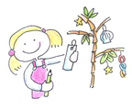Lesson 10
Culture notes Download pdf
Tanabata
The Story:
Tanabata tells the story of two Milky Way lovers. A beautiful girl called
Orihime would spend her days weaving intricate garments for her father,
Tentei (god of the sky). However, Orihime was a workaholic and her father
became concerned that she was spending too much time at her loom. He
therefore decided to introduce her to Kengyu*, a skilful farmer who tended
cows on the other side of the Milky Way river. They fell in love immediately.
However, Kengyu and Orihime spent so much time together that they started to neglect their jobs – the cows were left to roam the land and became sick, and Tentei received no new clothes. Tentei eventually became so sick and tired of the lovers’ behaviour that he decided to split them up. Orihime was banished to one side of the river and Kengyu to the other. However, the pair were so upset by the separation that neither of them could do any work and they spent their days pining for one another.
Tentei began to feel sorry for them and decided that they should be allowed to meet for one day each year – July 7th. However, if it rains on that day, the Milky Way river will flood and they will not be able to meet again until the same time the following year.
* Please note that in some versions of the story, including the Japan Society version, the character of Kengyu is called Hikoboshi.
Celebration
As June and early July are traditionally the rainy season in Japan, people
always pray that July 7th will be fine so that the lovers can be reunited.
Traditionally people always wrote wishes for the couple on strips of paper and
hung them from bamboo branches.
This tradition continues today, although many people now write their own
wishes as well. Alongside the wishes, other paper decorations are also hung
and some towns will host large Tanabata festivals where giant decorations
adorn the town centre. Sendai in Northern Japan is such an example. See the
following website for pictures of the event:
https://www.sendaitanabata.com/english/pc/outline/photo/

Activity Idea Why not have the children write their own wishes on a strip of paper (you could use the tanzaku wishcard template). You could perhaps then have the children share their wishes with one another. It is interesting to observe what they’ve asked for – is it something for themselves, or something for somebody else? The wishes could then be hung around the classroom.
Extension Activities:
See the Japan Society Tanabata webpage for more resources and ideas:
https://www.japansociety.org.uk/resource?resource=37